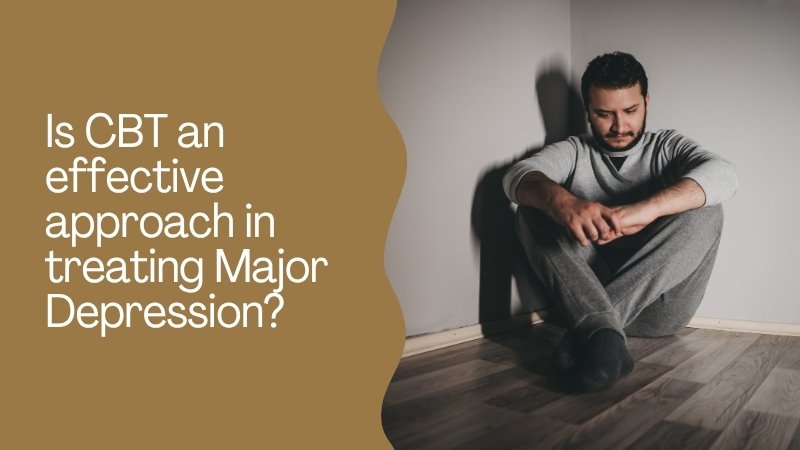Major Depressive Disorder (MDD), commonly referred to as major depression, affects millions of people worldwide. Characterized by persistent feelings of sadness, hopelessness, fatigue, and a loss of interest in daily activities, major depression can severely impact an individual’s quality of life.
As mental health awareness grows, so does the search for effective treatment methods. One such method that has gained considerable attention is Cognitive Behavioral Therapy (CBT). But the question remains: Is CBT an effective approach in treating major depression?
Treatment with CBT
The specifics of the treatment will change based on your issue. Nonetheless, CBT usually consists of the following:
- Assessment: Completing questionnaires to help you define your specific issue and identify upsetting symptoms may be part of the assessment process. In order for you and your therapist to monitor your progress and pinpoint issues or symptoms that require more care, you will occasionally be asked to fill out forms.
- Personal education: To assist you learn more about your specific issue, your therapist may give you written resources (books or brochures). One of the tenets of cognitive behavioral therapy is that “knowledge is power.” Having a thorough grasp of your specific psychological issue will enable you to eliminate irrational concerns, thereby alleviating anxiety and other negative emotions.
- Setting goals: Your therapist will assist you in creating a list of objectives you hope to accomplish throughout treatment (e.g., you may desire to overcome your social anxiety). Together with your therapist, you devise workable plans to achieve these objectives.
- Practice of strategies: You work with the therapist to put your new techniques into practice. To replace unhealthy or negative self-talk, you could, for instance, role-play challenging social situations or realistic self-talk, or the way you talk to yourself in your mind.
Who Can Benefit from CBT?
Many different types of people who are depressed can benefit from cognitive behavioral therapy. It can be applied as:
- A primary therapy for people with mild to severe symptoms.
- An additional treatment for people who are currently taking medicine.
- A relapse prevention tool for people who have had depression in the past.
People who are driven to participate in their treatment sessions and use the strategies outside of the therapist’s office will benefit most from cognitive behavioral therapy. However, CBT might need to be customized or used in conjunction with other interventions for people who have really severe depression or co-occurring mental illnesses.
Things to think about before picking CBT
Before deciding on CBT, you might want to weigh these points:
If you have a neurological condition or injury that affects thinking, CBT might not be the most suitable approach for you.
The therapy expects you to get involved. You could be asked to complete thought records, mood charts, or behaviour logs. If you aren’t ready to engage in those tasks, the outcome may fall short of your expectations.
Success relies on a solid partnership with your therapist. You need to trust and respect each other. If the therapist doesn’t feel like the right fit after the first session, trust that instinct and seek someone else.
Although CBT is designed to be brief, real change may still take many weeks or even months. If you want an instant turnaround, you could find the pace frustrating.
Why Choose CBT?
When used properly, cognitive behavior therapy (CBT) can be an effective short-term treatment for depression and, for even more profoundly depressed unipolar individuals, can be a good substitute for antidepressant drugs (ADM). Although there are few and inconsistent trials, cognitive behavioral therapy (CBT) may also be helpful as a supplement to drug treatment for bipolar individuals.
Though the research is still preliminary, there are also signs that cognitive behavioral therapy (CBT) may influence cognitive changes that, in turn, mediate changes in depression and freedom from relapse after treatment ends.
Limitations and Considerations
While CBT is highly effective, it’s not a one-size-fits-all solution. Some of the limitations include:
- Requires commitment: CBT involves active participation, self-reflection, and practice outside of sessions.
- Not ideal for crisis situations: Individuals in acute distress or those with suicidal ideation may require more intensive or immediate interventions.
- Varied response: Like any treatment, response to CBT can vary based on individual differences, including personality, history, and severity of symptoms.
For best results, CBT should be delivered by a qualified mental health professional who can personalize the therapy to each client’s needs.
Conclusion:
According to the findings, the CBGT group’s optimism and self-esteem levels considerably rose following the intervention; however, because of the irregularity of CBGT sessions, these variables’ levels eventually decreased once more. Consequently, special steps must be taken to ensure that CBT sessions for individuals with major depressive illness are held on a regular basis.


